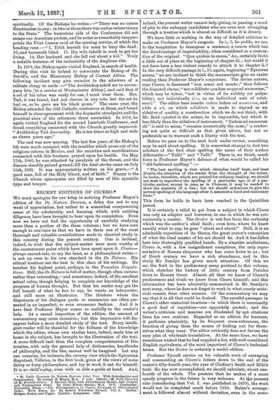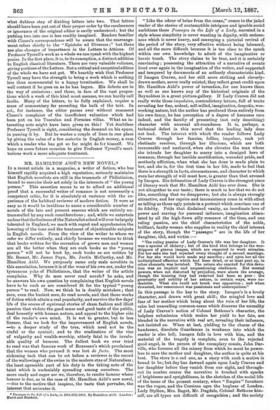RECENT EDITIONS OF CICERO"
WE must apologise for our delay in noticing Professor Mayor's 'edition of the De Nature Deomint, a delay due not to any want of appreciation, bat rather to a somewhat overpowering sense of the scholarship and learning which, with untiring diligence, have been brought to bear upon its completion. Even now we have not had the opportunity of carefully studying more than a portion of the three volumes ; bat we have seen enough to convince us that we have in them one of the most thorough and valuable contributions made to classical study in this country during the present century. One is inclined, indeed, to wish that the subject-matter were more worthy of the consummate pains which have been spent upon it. Cicero— always second-rate, to say the least, as a philosophical writer— is not up even to his own standard in the De Nature. His ethical treatises are the best in this class of his writings. He touches his highest point, perhaps, in the Tuseulan Disputa- tions. Still, the De Nature is full of matter, though often curious rather than interesting,—and sometimes, indeed, of the smallest actual value, though helping to complete our knowledge of the progress of human thought. But that his reader may get the full benefit of what he has to say, he wants an interpreter, and still more an illustrator. The thinkers whom the disputants of his dialogue quote or summarise are often pre- sented in an imperfect, or even erroneous fashion. And it is here that Professor Mayor comes so usefully to the reader's help. At a casual inspection of the edition, the amount of commentary may seem excessive ; but this impression will dis- appear before a more detailed study of the text. Every intelli- gent reader will be thankful for the fullness of the knowledge which the editor, whose own studies have, indeed, made him at home in the subject, has brought to the illustration of the text. A more difficult task than the complete comprehension of this treatise, with only the general help of dictionaries, handbooks of philosophy, and the like, cannot well be imagined. Let any one examine, for instance, the cursory view which the Epicurean disputant, Velleius, in the first book, gives of the views of some thirty or forty philosophers, and try to work it out for himself. It is no child's-play, even with so able a guide at hand. And, • M. Ciceroni. Do Mature Deorunt Libri Tres. With Introduction and Commentary. By Joseph B. Mayor, M.A. 3 vols. 188085.—M. Tolli Ciceroni. nd M. Bratunt Orator. A Revised Text, with Introdoctory Essays, and Critical and Explanatory Notes. By John Edwin Sandys, M.A. 18:5. Cambridge: University Press.—The Corr.:pm:delve of Cicero, Arrangod in Chronological Order. With Notes. de. By Robert Yelverton Tyrrell. Vol. 2. Dublin: Hodges, Foster, and Figgie. London : Longman.. 1886. indeed, the present writer cannot help giving, in passing, a word of pity to the unhappy candidates who are even now struggling through a treatise which is almost as difficult as it is dreary.
We have little or nothing in the way of detailed criticism to make on Professor Mayor's exegesis. In i., 3, he yields, we see, to the temptation to transpose a sentence, a course which has the disadvantage of improbability, when considered as a restora- tion of the original. " Qua quidem in canes," eh., certainly looks a little out of place at the beginning of chapter iii. ; but would it not have been a less violent remedy to attach it to chapter In the very difficult passage in i., 19, again, beginning "Epicurus autem," we are inclined to think the manuscripts give an easier reading than Professor Mayor's conjecture. The divine nature, says Cicero, is discerned " non scam ea mente ;" then follows the disputed clause," nec soliditate quadam neque ad numernm," which may be taken, "not in virtue of its solidity (or palpa- bility), nor individually (i.e., as an individual unit of exist- ence)." The editor here inserts easiest before ad numerum, and adds a sit, on which soliditate is made to depend as an ablative of quality, a construction which we do not think, with Mr. Reid (quoted in the notes), to be impossible, but which is less likely than the ablative of instrument. " Eadem ad numerum sit" is said to mean, "remains numerically the same," a render- ing not quite so difficult as that given above, but not so preferable as to warrant such a liberty with the text.
Before we pass on to the next book under review, something may be said about spelling. It is somewhat strange to find two scholars of the first class spelling the name of their author differently—" Tnllii" and " Tall" There is, we think, much force in Professor Mayor's defence of what would be called his "old-fashioned spelling ":—
" The best spelling is that which obtrudes itself least, and least diverts the attention of the reader from the thought of the writer. In books, therefore, which are printed for ordinary reading, we should not seek to reproduce the spelling of a particular age, or of a par- ticular author, except in case, as in Chaucer, it may be needed to show the scansion of a line ; but we should endeavour to give the normal spelling of the language after it assumed a fixed and stationary form."
This form he holds to have been reached in the Quintilian period.
It is certainly a relief to get from a subject in which Cicero was only an adapter and borrower, to one in which he was pre- eminently a master. The Orator is not free from the verbosity which was the author's chief fault ; even here, where he knew exactly what to say, he goes " about and about." Still, it ie an admirable exposition of its theme, the great orator's conception • of what the ideal master of his art should be. And it has fallen here into thoroughly qualified hands. By a singular misfortune, Cicero is, with a few insignificant exceptions, the only repre- sentative of Roman eloquence who has come down to us ; but of Greek oratory we have a rich abundance, and to this study Mr. Sandys has given much attention. Of this we see the fruit in the preliminary essay prefixed to this volume, which sketches the history of Attic oratory from Pericles down to Roman times. Almost all that we know of Cicero's predecessors and rivals we know from Cicero himself; and this information has been admirably summarised in Mr. Sandys's next essay, where he does not forget to work in what scanty mate- rials remain from other sources. Of the commentary we may say that it is all that could be desired. The parallel passages in Cicero's other oratorical treatises—in which there is necessarily a good deal of repetition—are appositely quoted ; and the writer's criticism and maxims are illustrated by apt citations from his own orations. Regarded as an edition for icemen:, it performs admirably, by its frequent cross-references, the function of giving them the moans of finding out for them- selves what they want. The editor evidently does not favour the easy plan of wholesale translation. At the same time, we have sometimes wished that he had supplied a list, with well-considered English equivalents, of the most important of Cicero's technical terms. But the Orator is certainly a model edition.
Professor Tyrrell carries on his valuable work of arranging and commenting on Cicero's letters down to the end of the orator's fifty.fourth year, the year of Clodins's death and Milo's trial. He has now accomplished, we should calculate, about one- fourth of the whole. The promise that he makes of a more speedy progress in the future is very welcome. At tie present rate (considering that 'Vol. L was published in 1879), the work would not be completed much before 1910. Baiter's arrange. ment is followed almost without deviation, even in the some- what dubious step of dividing lettere into two. That letters should have been put out of their proper order by the carelessness or ignorance of the original editor is easily understood ; but the putting two into one is less readily imagined. Readers familiar with Cicero's correspondence will be aware that the rearrange. ment refers chiefly to the " Epistolce ad Diversos ;" but there are also changes of importance in the Letters to Attions. Of Professor Tyrrell's work as a whole we can speak with the highest praise. In the first place, it is, in its conception, a distinct addition to English classical literature. There are very valuable volumes, giving portions of the Letters. But a critical and exegeticaledition of the whole we have not got. We heartily wish that Professor Tyrrell may have the strength to bring a work which is nothing less than monumental to a happy termination. We shall be well content if he goes on as he has begun. His defects are in the way of omissions ; and these, in face of the vast propor- tions which a work of this kind mast assume, we can hardly call faults. Many of the letters, to be fully explained, require a masa of commentary far exceeding the bulk of the text. In xci., for instance, the editor passes over without comment Cicero's complaint of the insufficient valuation which had been put on his Tuscalan and Formian villas. What an in- teresting note might have been given on this ! Yet doubtless Professor Tyrrell is right, considering the demand on his space, in passing it by. But be wastes a couple of lines in one place by giving the value of a few sesiertia in English money, a sum which a reader who has got so far might do fcr himself. We hope on some future occasion to give Professor Tyrrell's meri- torious work a more adequate treatment.



































 Previous page
Previous page